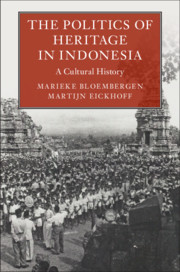Book contents
- The Politics of Heritage in Indonesia
- Asian Connections
- The Politics of Heritage in Indonesia
- Copyright page
- Contents
- Figures
- Preface and Acknowledgements
- Abbreviations
- Introduction: Towards a Mobile History of Heritage Formation in Asia
- 1 Site Interventions, Knowledge Networks, and Changing Loyalties on Java, 1800–1850s
- 2 Exchange, Protection, and the Social Life of Java’s Antiquities, 1860s–1910s
- 3 Great Sacred Majapahit: Biographies of a Javanese Site in the Nineteenth Century
- 4 Greater Majapahit: the Makings of a Proto-Indonesian Site across Decolonisation, 1900s–1950s
- 5 The Prehistoric Cultures and Historic Past of South Sumatra on the Move
- 6 Resurrecting Siva, Expanding Local Pasts: Centralisation and the Forces of Imagination across War and Regime Change, 1920s–1950s
- 7 Fragility, Losing, and Anxieties over Loss: Difficult Pasts in Wider Asian and Global Contexts
- Epilogue: Heritage Sites, Difficult Histories, and ‘Hidden Forces’ in Post-Colonial Indonesia
- Bibliography
- Index
Epilogue: Heritage Sites, Difficult Histories, and ‘Hidden Forces’ in Post-Colonial Indonesia
Published online by Cambridge University Press: 24 December 2019
- The Politics of Heritage in Indonesia
- Asian Connections
- The Politics of Heritage in Indonesia
- Copyright page
- Contents
- Figures
- Preface and Acknowledgements
- Abbreviations
- Introduction: Towards a Mobile History of Heritage Formation in Asia
- 1 Site Interventions, Knowledge Networks, and Changing Loyalties on Java, 1800–1850s
- 2 Exchange, Protection, and the Social Life of Java’s Antiquities, 1860s–1910s
- 3 Great Sacred Majapahit: Biographies of a Javanese Site in the Nineteenth Century
- 4 Greater Majapahit: the Makings of a Proto-Indonesian Site across Decolonisation, 1900s–1950s
- 5 The Prehistoric Cultures and Historic Past of South Sumatra on the Move
- 6 Resurrecting Siva, Expanding Local Pasts: Centralisation and the Forces of Imagination across War and Regime Change, 1920s–1950s
- 7 Fragility, Losing, and Anxieties over Loss: Difficult Pasts in Wider Asian and Global Contexts
- Epilogue: Heritage Sites, Difficult Histories, and ‘Hidden Forces’ in Post-Colonial Indonesia
- Bibliography
- Index
Summary
The epilogue re-evaluates two related problems central in the monograph: the relationships between heritage and violence and between heritage and religion. It does so, first, by focusing on case studies that reveal the relation between sites, heritage dynamics, and the taboos and silences concerning the massacres of 1965 in Indonesia. Secondly, it reassesses the question of Indonesian Islam and its implicit absence in heritage politics, both at a global level and in the Indonesian context. In light of violent heritage conflicts concerning religious-cum-heritage sites in colonial and contemporary India, it may seem remarkable that, in predominantly Islamic Indonesia, a Buddhist and a Hindu shrine remain the most important national monuments. However, the mobile approach to heritage has made clear how and why Borobudur and Prambanan as national monuments are not necessarily what they look like from canonical art-historical perspectives or tourist guides. They were and are being (re-)made in exchanges of knowledge, and exchanges of partial ownership at different levels (religious, economic, scholarly, spiritual, universalising).
Keywords
- Type
- Chapter
- Information
- The Politics of Heritage in IndonesiaA Cultural History, pp. 267 - 281Publisher: Cambridge University PressPrint publication year: 2020



